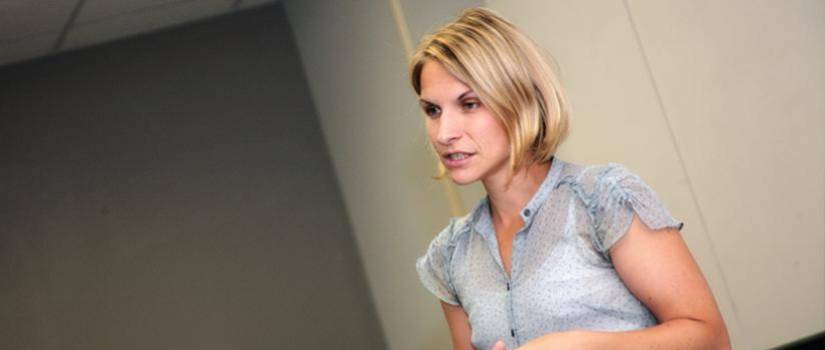Very few people discover their calling on Christmas Day. For thirteen-year-old Leah McClimans, a small holiday gift — The Collected Works of Ralph Waldo Emerson — was a spark that set her ambition in motion.
Decades later and now a philosopher of medicine and medical ethics with more than 10 years of classroom instruction experience, Dr. McClimans helps students of the College of Arts & Sciences ready for careers that can involve complex, moral situations that inevitably arise when people and health care intersect. It is a valuable education she learned on the ground within a busy Toronto hospital as a post-doctoral student.
“As a philosopher, you normally spend a lot of time by yourself in a room so I had essentially spent six years like that,” she says. “All of a sudden, I am in a hospital with very real-time problems of real people. They did not care about my philosophical theories; they needed answers.”
Teaching classes ranging from medical ethics to contemporary moral issues, Dr. McClimans focuses on bringing real world experience to students. “I want them to see how the philosophy that we are doing has real meaning,” she says. For some classes, the reality unfolds in the form of clinical ethics consultations in which Dr. McClimans poses scenarios, which small-group committees must work in tandem to untangle and resolve.
Not only do students address delicate issues such as sexual consent, homebirths, or patient requests for nonbeneficial treatments, Dr. McClimans shares, they have to learn how to work together. “What students often don’t know is that many practicing physicians wish they’d had more managerial and leadership training as students,” she says. “In these mock consultations, students’ roles change with each scenario so they can practice being a leader or analyst as well as learn the offline work of delegation, logistics, working with different personality types, and coping with what can be sensitive personal beliefs.”
The state of healthcare today is as vast as the world Dr. McClimans envisioned as a curious 13-year-old. “Healthcare is so different now. It is very measurement and outcome oriented, but it is also specialized so you have these large teams working with patients. It is no longer just a doctor and a patient,” she says.
The shift, she believes, began after the Second World War with a move from treatments delivered to patients based on a clinician’s expertise and historical relationship with a patient, to treatments delivered to based on clinical evidence. It was a transition that involved everything from the structure of healthcare systems to delivery of clinical care.
Despite all the studies, methodology exploration, and data measurement, human values are still an intrinsic aspect of healthcare. “Ethical issues are in the bedrock of outcomes and measurement,” she says. “The notion that you can measure away value in science and medicine is just false. The more we try to do it, the more we see that there are issues we cannot measure.”
